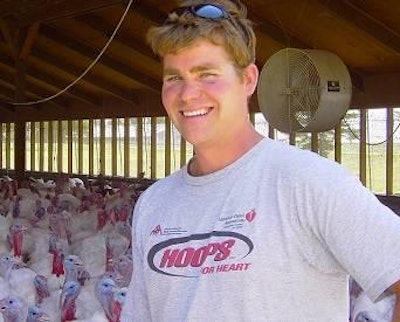
The Senate Committee on Agriculture, Nutrition and Forestry heard a testimony from Iowa turkey farmer Brad Moline, whose flocks were devastated from highly pathogenic avian influenza (HPAI). The committee on July 7 held a hearing on avian influenza and its impact on the U.S. poultry sector.
"I am currently living the avian influenza nightmare," said Moline. Testifying on behalf of the National Turkey Federation's growers and processors before the committee, Moline said two thirds of his family's farm income has been wiped-out with the loss of all 12 growing barns containing more than 56,000 turkeys. The nationwide loss from HPAI of nearly 8 million turkeys and an economic impact of nearly $500 million and 400 employee layoffs has weighed heavily in communities where each of the 153 cases has struck since late January.
"If we are lucky, we will be able to salvage this year with one flock that we hope to repopulate soon," said Moline of his farm that, before HPAI, raised 155,000 turkeys a year. "Without APHIS indemnification payments, many farmers may have been forced to hang it up. We appreciate Congress and USDA for their continued support of indemnification. We will depend heavily on these payments until our next flock goes to market around Thanksgiving."
Recommendations to help eradicate avian influenza
The third-generation turkey farmer from Manson, Iowa, came to the committee with recommendations critical to eradicating the disease - depopulation within 24 hours, streamlined disposal, consistent repopulation strategy, viable vaccine and the necessity for a coordinated and enhanced focus on biosecurity. Moline said increased efficiency will require clear communication.
"Initially, federal and state governments missed a critical opportunity to sit down with industry to develop a defined game plan," said Moline. "This would avoid the mass confusion that we experienced in Iowa. Having a clear roadmap explained by government officials (not contractors) is a must. We understand contractors play an important role in eradication but, they should have been better trained. Finally, we recommend that USDA staff assignments overlap in the field to reduce communication errors."
Better biosecurity practices suggested
Moline also recommended that APHIS needs to examine biosecurity practices, especially those of their contractors. "APHIS is doing an excellent job of documenting the transmission of this disease, but to date the agency has shared very little information that examines the role delayed depopulation and biosecurity lapses played in spreading this disease."
Benefits of an avian influenza vaccination strategy
Many strategies will be needed for the recovery of growers affected by HPAI. Moline cited one of the most powerful tools would be the use of a vaccine to eradicate the disease, in a limited, targeted strategy. "Under an approved vaccine strategy we can ensure trade partners and customers that infected birds will never leave the farm and that no meat from vaccinated birds gets exported," concluded Moline. "However, we lack the assurance that we will be allowed to use this powerful tool even with protocols that will guarantee its safe usage."















